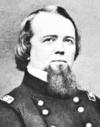- Pope, John
-
died Sept. 23, 1892, Sandusky, OhioU.S. army officer.A graduate of West Point, he served in the Mexican War. At the outbreak of the American Civil War, he was appointed brigadier general of volunteers, and he commanded operations that secured Union navigation of the Mississippi River almost to Memphis. In 1862 he was given command of the Army of Virginia. At the Second Battle of Bull Run, his forces were defeated. Though he tried to blame the rout on his subordinates, including Fitz-John Porter, he was relieved of his command and sent to Minnesota to quell a Sioux uprising. After the war he commanded the Department of the Missouri (1870–83).
 John PopeBy courtesy of the Library of Congress, Washington, D.C.
John PopeBy courtesy of the Library of Congress, Washington, D.C.* * *
▪ United States generalborn March 16, 1822, Louisville, Ky., U.S.died Sept. 23, 1892, Sandusky, OhioUnion general in the American Civil War who was relieved of command following the Confederate triumph at the Second Battle of Bull Run. (Bull Run, battles of)A graduate of the U.S. Military Academy at West Point in 1842, Pope served as a topographical engineer with the army throughout most of the 1840s and '50s. He did, however, see combat during the Mexican War, serving with distinction in the campaigns of General Zachary Taylor.Following the outbreak of the Civil War, Pope was appointed brigadier general of volunteers in 1861 and was promoted to major general in 1862. After securing the Mississippi River for the Union almost as far south as Memphis, Pope attracted the admiration of President Abraham Lincoln. He was made a brigadier general of the regular army and transferred to Washington, D.C., where he was given command of the Army of Virginia.In August 1862 a Confederate force under General Stonewall Jackson (Jackson, Thomas Jonathan) moved toward Pope's army. Jackson's force was reinforced by troops under generals James Longstreet and Robert E. Lee, and Pope—misgauging the number and location of the enemy—issued muddled and confusing orders. The result was the decisive defeat at the Second Battle of Bull Run, August 29–30, and the loss of about 15,000 Union troops. Pope attempted to blame his subordinate officers—especially General Fitz-John Porter (Porter, Fitz-John)—for the debacle, but in September Pope was relieved of his command and sent to Minnesota to quell a Sioux uprising.After the Civil War, Pope served in various posts, notably as commander of the Department of the Missouri (1870–83), in which he was primarily engaged in protecting settlers in the Northwest and Southwest from Indian attacks. On Oct. 26, 1882, he was promoted to major general of the regular army, a rank he held until he retired in 1886.* * *
Universalium. 2010.
